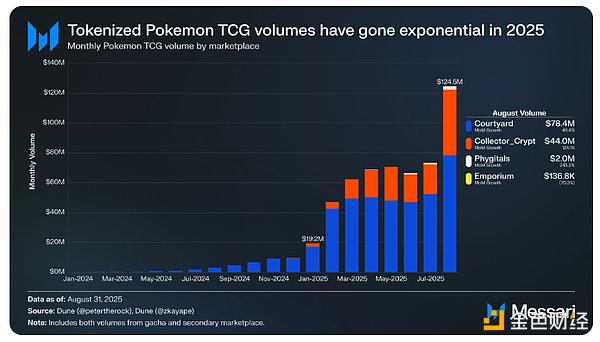Source: Bankless; Compiled by Golden Finance. Putting Pokémon cards on the blockchain. At first glance, the idea might seem a bit strange. However, upon closer inspection, the intersection makes a lot of sense. As Bitwise's Danny Nelson recently highlighted, Pokémon cards are a multi-billion dollar market that, at least until now, has been off-chain, informal, and inefficient. In contrast, card tokenization platforms offer a variety of new advantages, such as 24/7 global liquidity, instant resale, DeFi composability, transparent provenance, vault services, and more. These benefits are also beginning to gain popularity. Last month, top card tokenization platforms saw over $120 million in trading volume, primarily through digital pack ripping, secondary trading, and Gacha games.

Nevertheless, there are already several established projects in this space, and the number of emerging ones is growing.
Courtyard
Courtyard, which has operated on the Polygon platform for over two years, pioneered the use of NFTs (non-fungible tokens) based on physical assets, a popular approach for tokenized card platforms. Pokémon cards are Courtyard's main selling point, particularly through its pack vending machines, but it also stands out for its support for sports cards and comic book collectibles. Courtyard, with nearly $80 million in trading volume last month, currently leads the market. As for KYC, aside from redeeming and shipping cards, there are no additional requirements, but your data is deleted after 90 days and Courtyard never sees it. However, the next biggest challenger, Collector Crypt, is catching up. Built on Solana, this platform saw $44 million in trading volume last month, solely through Pokémon cards and Gacha Machines in its marketplace. Besides this exclusivity, it also differs from Courtyard in that it has a native token, CARDS, which has seen its market capitalization surge to $85 million since its launch less than a week ago. It's important to note that the platform requires personal information to withdraw funds (such as your name, address, and the last four digits of your Social Security number), so proceed with caution and don't deposit anything you wouldn't sign. Phygitals Another new project making progress on Solana is Phygitals. You don't need to deposit anything here, as you can simply bring your own wallet (such as Phantom) to trade on the Marketplace. Like Courtyard, KYC information is only required when redeeming cards. The platform saw $2 million in trading volume in August, a 245% month-over-month increase, so it's starting to trend upward. In addition to the card shop, Phygitals also has a neat claw machine where you can buy random Pokémon packs, with prizes ranging from $1 to $500. A new auction system is also in the works, allowing users to bid on premium cards. Emporium Another notable platform on Solana is Emporium. Like Phygitals, it uses Privy to create accounts, so you can log in with your email or Google account. Similarly, you don't have to deposit money here, as you can connect your own wallet. Of the projects I've mentioned so far, I found Emporium's vending machine to have the smoothest card-opening user experience in terms of speed and convenience of buying and selling. It allows you to buy random PSA 10-grade Pokémon cards for 60 USDC each, and if you don't like the card you draw, you can immediately sell it for 85% of its market value. To redeem, you simply provide your address and pay for shipping (up to 10 cards for $25). Currently, the aforementioned platforms are the most well-known in the tokenized card space, but their adoption is rapidly expanding. Other new projects worth keeping an eye on include: RIP.FUN, built on Base, is currently in closed beta, so you'll need an invitation to get started. It aims to be an on-chain hub for Pokémon cards, where you can open mystery packs, redeem cards, trade, track sets, and more. It also offers an experience point system that can be used to unlock additional rewards like special collectibles. Built on Solana, Grailed is another tokenized Pokémon card trading platform where you can buy pre-owned cards or open packs digitally. Unlike the other projects mentioned so far, Grailed uses its own virtual currency, gems, for pricing: 1,000 gems cost 0.05 SOL. The cheapest card pack I saw here costs 2862 gems, which is currently around $30. ToCa, built on Solana, offers a prize game similar to PoolTogether. In other words, it's not a card trading marketplace, but rather a hub for prize pools, each backed by PSA 10-grade Pokémon cards. To join, simply purchase ToCa's native token, TCG, and every dollar you hold counts toward entry into all active prize pools. Beezie is built on Flow but also supports cross-chain payments via ETH, SOL, and more. Flow is EVM-compatible, so you can get started with your existing Ethereum wallet. Beezie offers a variety of features, including tokenization and vaulting. However, its main draw is its universal marketplace and claw machine, which allows you to instantly resell any card for 90% of its market value. The platform also supports comics and sports cards. DYLI, built on the Abstract platform, offers a range of Pokémon-related products (such as graded and ungraded cards, single-card booster packs, and sealed collectibles), as well as non-Pokémon-related products (such as precious metals, merchandise, and Magic: The Gathering cards). The platform also features basic Dabble and Flip games, which are fun and easy ways to obtain random cards. There's also a Creator Studio where you can create your own merchandise. Drip, built on Ronin, supports a variety of physical collectibles in addition to Pokémon cards. It's also known for its livestream shopping feature, allowing community sellers to host video experiences like "tear-down" or "ship-out" events. If you've been using Ronin lately and are looking to expand beyond gaming, Drip is a great option to consider.
 Joy
Joy









